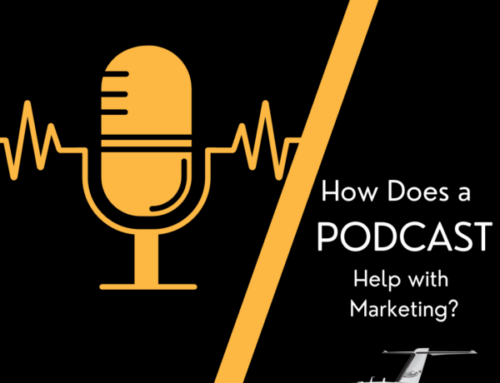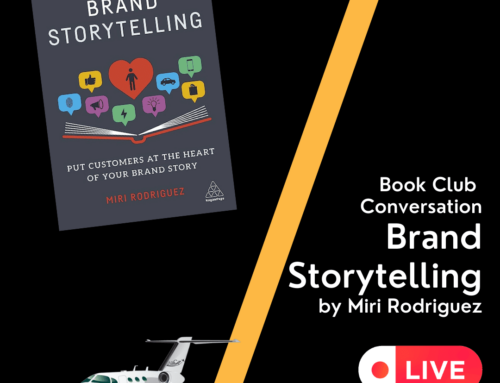Transcript – Book Club Discussion, Marketing 4.0 by Philip Kotler.
Paula Williams: Welcome to this week’s episode. Today, we are talking about Marketing 4.0 by Philip Kotler, and we are all by our lonesome, which is not surprising because this is not the world’s most accessible or easiest, or most fun book that we’ve read but I think it is definitely worth jumping into. I will defend my point of view as I’m sure John will disagree as we move forward, right?
First impressions, what did you think?
John: Well, firstly, tell me who you are you’re the… There’s nobody here but you and me so…
Paula: Oh, right, yeah. I guess we do need to do introductions and all of these formalities. Even though it’s just us kids. So I’m Paula Williams with ABCI, we help aviation companies sell more of their products and services.
John: And I do back-end stuff for ABCI, and most everybody watching this knows.
Paula: Exactly, and if you didn’t know, you know now. So once a month, we discuss a book about sales, marketing, business, some other topic, that’s really important to our clients and we vote on those books every year. This one was my vote and it just barely squeaked in, probably because it is not the coolest, sexiest, or neatest topic, or book on the market these days. But I think, including Philip Kotler was certainly necessary because we haven’t yet, weirdly, and he was a huge influence on me in college and so on. But there are some ways that what he does applies to Aviation Marketing and some ways that he doesn’t but it certainly is a mindset that is worth talking about so, anyway, your first impressions John? Back to that.
John: Well, yeah, you get into this thing a little bit and it just reminds me too much of marketing and business school. When they presume that you have a marketing budget and can do all of the testing and all of us this and that, you know, like you’re a Coca-Cola or Ford, GM[?] or Pepsi and the majority of folks in aviation don’t have those dollars to do testing with, to prove and disprove theories. And even if he’s got the theory proven, you still have to go out and do testing to see how that applies to your specific instance. And to me I just don’t see that, I mean, yeah, it’s good for you because it’s your business. And that’s fine but you only have 30 minutes to 45 minutes in an initial consultation of the client to say “We need to do this ABCD wrap[?]”, and you’re not going to be able to use in much of that stuff to make that analysis.
Paula: Right? Well, let me back up and…
John: You asked.
Paula: Yeah, exactly. And there’s a lot of validity to what you say is as always. But this guy is, I don’t know how much you know about Philip Kotler to start with, but let me back up and tell the story, he came from Russia in the 30s, right? So he’s in that same, or at least his parents came from Russia in the 30s. I’m not sure if he was born yet. But anyway, he’s a really, really old guy. I’m sure he’s probably still alive. I hope he’s still alive because he’s really, really cool.
But he’s in that same immigrant mindset as Ayn Rand, where capitalism is not only, not the problem, it is the solution to a lot of the problems in the world and then he believes and has probably done more to prove this than anybody else on the planet, that marketing is the solution to many of the problems with capitalism and, you know, so a lot of the things that he’s done before, Kotler, advertising and marketing were kind of a mess, you know, basically, the only way that a company would do marketing would be to advertise more, you know, or yell louder. Buy more media and those kinds of things Kotler really made his science out of it. He introduced the four Ps. You probably heard of that. Where it goes way back before you start barking about your product, into how you design your product, you know, and how you position, and your product, and how you price your product. And all of those things are marketing decisions and that was not the case before Kotler. You know, it was all just, “Here’s a product, go sell it”, and advertisers were just, their job was just to sell the product that already existed, right?
John: Well, and even today, not very many products are designed with marketing in mind. [inaudible], back when I was working with the developers at IBM they didn’t do that.
Paula: Maybe not, but they should.
John: If they had, you wouldn’t have a lot of products we have today because it wouldn’t have been able to get sold and we need the products we have [inaudible]. So there’s a [inaudible]
Paula: Right? So it’s a chicken and egg, kind of a thing, you sometimes have to sell the product that you have and often that’s the job that we’re called to do when people hire us as a marketing company. But you know, what’s really interesting is when we get to be partners with companies that we’ve been working with for years and they bring us in earlier on those conversations about how do we position this product, how do we create our offers, the list, the offer, of the presentation, that’s all Kotler. And that all makes it a thousand times more effective. If you are selling something that people actually want, rather than trying to peddle something that isn’t the best option. So, that competitive positioning and all that stuff, that’s Kotler.
John: Yeah, well that’s not [inaudible] used to do. They’d have focus group, they call them, and then they would go saying, “Well, we want to sell, what would you like to see in the product today?”. And then they would go back, they would have multiple focus groups over time, as they designed and built product day. So when it came out, it was pricey but it had everything on it, that the focus groups that was a good thing.
Paula: Right, exactly. And you know, in aviation we really don’t have that luxury. I thought of having focus groups because the numbers are too small to be statistically significant, right? And having been statistics in college. I know. You know, when you have a small sample size, everything gets blown off by some weirdo with a crazy opinion, right? Aviation is full of weirdos with crazy opinions.
John: The other problem is that you have [inaudible] licensing[?] that have to be complied with.
Paula: True, definitely true. But some of the things that we can take and use from Kotler are well… Just to finish the story, you know, where he came from, with this mindset of capitalism will solve all the world’s problems and marketing will solve all of capitalism’s problems. He started a project called The Wicked Seven to get marketing students involved with solving some of the biggest problems in the world. And so he’s probably done more than anybody, I know toward the end of promoting capitalism and promoting marketing as a good thing as opposed to A Force For Good, as opposed to just a way of barking about products, right? Anyway, so, and I know you really like Atlas Shrugged, you know, you really like Ayn Rand and you really like that mindset, that producers should be rewarded and that everything else is kind of superfluous and causing problems. He is definitely one of those guys, and I think he does it a whole lot better than Ayn Rand ever did because he actually turned it into projects that have actually done some good in the world. But anyway, so that’s me fangirling Philip Kotler. But anyway, and, this book in particular, as far as this particular book goes, I don’t know that he’s the best person to be talking about moving from traditional to digital, because I think he’s still in the Harvard School of Business, he was in the Kellogg School of Management. He’s in all of these places. He worked for all of these monstrous Brands. He doesn’t know how to do a new brand. He doesn’t know how to do a, doesn’t care really. How to do a new brand and doesn’t really care how to do a small brand as all Aviation Brands really are by necessity, because we only serve the top 1% of the world’s population, right?
John: Yeah, he’s also stuck so much in traditional, that he can’t really get out of it. He knows he needs to get out of it. But what he writes, he didn’t.
Paula: Right. So for me, it was just a really nice trip down memory lane as far as, “Wow, this is really cool”. You know, this guy really knows his stuff and he really has created a science out of something that I thought was less than savory or less than scientific, or less than any of the other arts of journalism, but he really kind of turned marketing into something respectable. So for that, he has my undying affection but for this book not so much. Makes sense? So was there anything that you did learn in college about marketing that is useful to what we do at ABCI?
John: Probably but it’s probably all background and it’s nothing overt that I could tell you “You need to go do this.”, well that, and because in college, even in all the [inaudible] names in the program term, they were laboratory courses in computers where you assume you’re going aftermarket share versus whatever, and you had ten million dollars. What are you going to do with the money? Who’s got ten million dollars?
Paula: Yeah, and you’re selling [crosstalk] t-shirts or coasters.
John: [inaudible] marketing, but the last part is experimentation. That’s just doesn’t happen these days. [inaudible] with IBM and those guys might have, you know, somebody’s got really deep pockets and they are actually listening to their marketing staff because they’ve done well, but that’s rare, even at the higher echelons it’s rare.
Paula: Yeah, so I guess, I would say the problem with the book is that most of our clients would run out of a budget by about page 5.
[inaudible]
Paula: So all of this stuff is good information and sound theory, but we really have to abbreviate in order to get anything done on the time frames and within the budget that most of our clients are working with. So that’s why we do the marketing worksheet is very Kotler, but it’s very abbreviated, right?
John: Yeah, but I think your experience with the larger companies, you’ve worked for before you started this one and the experience you’ve had with this one. Yeah, that would be a good book for you to put in the back your head, but it has to be something that you apply in very isolated circumstances. Because he said “Well, we need to go do this.”, but it’s such a rare instance because you don’t have the time or the clients don’t have the dollars [inaudible].
Paula: Yeah. It was kind of like you versus a check engine light. A check engine light works for 80% of, maybe even 90% of the things that go wrong with a car or an airplane.
John: Airplanes, you…
Paula: Don’t really have the check engine lights but you have the basic diagnostics on the dashboard.
John: Some of the more sophisticated airplanes, you’ll have what they call a Master Caution Light and a Caution-Warning panel, and individual lights come on, and they all light the Master Caution, you got to go and look at each one of them and those things are really well done. However, my car, check engine light. I don’t know.
Paula: Okay, well what [crosstalk] I’m saying is–
John: Most people ignore it anyway.
Paula: Most people, for most people, the check engine light is enough information to get them to a specialist. For most of our clients, a marketing worksheet is enough information to get them to a successful campaign. But if it doesn’t work, you have to know enough about an engine to back off and say, okay, you know, what’s causing this? Why does this keep happening? You know, if the engine light keeps coming on, or if what you’re doing doesn’t solve the problem, how do you back off enough to know enough about marketing, as an example, to fix the problem? And you know, that’s really where Kotler comes in, is that general knowledge, so you know, as much as you know about an aircraft, you can kind of sense what’s going wrong with it before the check engine light even comes on. I would like to get to the point when I grow up, to know enough about a marketing campaign to be able to sense, what’s going wrong with it before the check engine light comes on. So, you know, that’s why we use the campaign worksheet, is just an abbreviation of all of this. And that’s why a lot of the processes and templates and checklists and things like that we use are a lot more practical for our clients. But then sometimes we have to back off and look at the theory behind it and say, “Why is this working” or “Why is it not working?” more likely, right?
John: Right. But that’s for you to do, that won’t be for them to do.
Paula: Exactly. Okay, so what you’re saying is that I was terribly selfish and including this on the book list for our clients because they’re not going to care.
John: Did I say that?
Paula: Yes you did, as a matter of fact. You stand by your opinion that this was probably not much use to, man or beast.
John: Well, no, I didn’t say that. It should be a lot of use to you because when you’re working with clients then you have this background data and when you try to go down a certain road, you can “Uhh, you don’t want to do that.”, because, and if you want to get into in more detail, we can do that offline, but, you know what they didn’t want to do that, and you’re just glossing over the top, that they really want the detail, you give it to them. As far as they’re concerned? No, I can’t think of any of our clients who would want to take the time to try to figure it out. It’s like hitting a book on stats and tell him to figure it out and come back and tell me what the probability is.
Paula: Yeah, I just think it’s good. I think everybody should know who Philip Kotler is because it’s just like knowing who Jack Welch is, or who Bill Gates is. I mean it’s a thing that is necessary in business and I think it’s really helpful to know that there is somebody out there that really does think that marketing is the solution to all the world’s problems and has done a pretty good job of proving it. And I think that that’s cool.
John: If somehow, somebody like that could impart to business owners and when the economy turns down, you don’t drop marketing, you actually spend more on it. That was driven into me very, very not dramatically in business school and in some of those things we did. So, he was down, that’s why when the economy went down the last year, so we didn’t drop off marketing, we actually increased our budget for it.
Paula: That’s true. We did economize on some of the more expensive things, we do like printing.
John: Yeah, but then we spend it somewhere else that does more valid good.
Paula: Yeah, exactly. Especially since people weren’t in their offices. There’s no point in sending things to people’s offices. So we did adjust.
John: We end up spending more last year, yeah, all of last year, and little before a year that. And then, now we’re, I think we’re just starting to even out of the where we normally would have been, had that not happened.
Paula: Yeah, I think that’s true. So I guess, you know the one takeaway that I would hope that people get from this book or from having sent this book, whether or not they even read the book. If only all they do is listen to the video, is basically that marketing is a very integral part of business. It should be a part of product design. It should be a part of positioning, it should be a part of deciding who your market is. And all of that is so fundamental to capitalism and so I mean, if you are a devout capitalist, you should appreciate Kotler’s contribution, I think to it and know where that comes from and yeah, totally understand the fact that marketing is an integral part, even if the economy’s down whatever, you run out of money. It’s not like advertising, that you can just drop, you know, you have to keep marketing. Even when something is has gone awry and in the economy or in your cash flow or anything else, one of those fundamentals of business, it’s like blood flow, you just have to keep it running. Even if you’re injured, you have to find a way to exercise around that bum knee or whatever. You’ve got to find a way around it and keep doing it.
John: Yeah, I’m so lucky.
Paula: Cool. Okay, so once again, Paula Williams, ABCI, we help aviation companies sell more of their products and services. And we use Kotler’s brain whether or not you knew it.
John: May you all stay safe and healthy, and we’ll see you next time.
[END]
Buy our 2022 Book Club Selections from Amazon.
ABCI does receive a tiny commission when you purchase through these links.
Podcast: Play in new window | Download
Subscribe: Google Podcasts | Spotify | Amazon Music | RSS






Leave A Comment